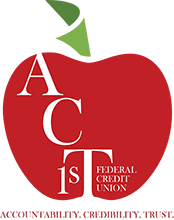What is National Financial Capability Month?
April is National Financial Capability Month. Originally designated as National Financial Literacy Month in 2004, this observance has evolved to focus on financial literacy and ensure that Americans have access to unbiased and trustworthy financial education and understanding of financial services and products. This observance also includes raising awareness of consumer protection laws as well as consumer education, helping Americans recognize, avoid, and report frauds and scams.
What is Financial Capability?
The U.S. Treasury defines financial capability as “the capacity, based on knowledge, skills, and access, to manage financial resources effectively.” In other words, it’s your ability to put your financial knowledge and skills to work. This translation of knowledge to action (behaviors) helps you manage and protect your money, build productive financial habits, and move closer to your present and future financial goals.
Building and maintaining financial capability is a lifelong journey. It’s a cycle of learning and leveraging what you know. It’s about understanding and assessing your situation, including your beliefs and feelings about money. It’s also about processing knowledge and information, evaluating options, making informed decisions, and taking action. The more informed you are about your financial choices, the better your financial outcomes are likely to be.
No matter where you are on your financial journey, increasing your financial capability can be as simple as:
Ask for help. If you’re struggling financially, immediately contact your credit union or bank, credit card company, utility provider, mortgage company, or landlord. Although it’s never easy to ask for help, it’s better to work out a payment arrangement than to let the account fall behind.
Check your credit. Pulling your credit report once a year to make sure the information is accurate, complete and up-to-date. Reviewing your credit report will also help to guard against identity theft.
Beware of frauds and scams. Each year scam artists and identity thieves steal billions of dollars from unsuspecting consumers. Learn how to recognize common scams, protect yourself and your money, and take action if you think you are a victim of fraud.
Build or refine your budget. The NCUA encourages you to use our Money Basics Guide to Budgeting and Saving. Having a budget allows you to have a clear view of your income and expenses all in one place. It will help you live within your income, prioritize saving, and meet financial goals, today and in the future.
Learn something new. What financial decision have you avoided because you don’t know what to do? Research that topic on MyCreditUnion.gov so you can make an informed decision.
How are the NCUA and Credit Unions Involved?
Under the Federal Credit Union Act, promoting financial literacy is a core credit union mission. While credit unions serve the needs of their members and promote financial literacy within their communities, the NCUA works to reinforce credit union efforts, raise consumer awareness and increase access to credit union services. The NCUA also participates in national financial literacy initiatives, including the Financial Literacy and Education Commission(Opens new window), an interagency group created by Congress to improve the nation’s financial literacy and education.
In addition, the NCUA partners with the Federal Deposit Insurance Corporation and the U.S. Department of Education in a Youth Financial Education Collaboration Agreement aimed at helping students and families save for college and encouraging the development of smart money habits. The NCUA is also a national partner of the Jump$tart Coalition(Opens new window) for Personal Financial Literacy.
Related Resources:





